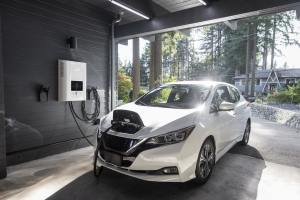
New electric vehicle rebates are expected to become available in Massachusetts in early summer, some nine months after lawmakers passed a bill calling for the incentives’ immediate implementation.
The state has said funding and logistical obstacles have delayed the launch of the new provisions, which will add higher incentives for low-income car buyers, create a rebate for the purchase of used electric vehicles, and establish a system for providing rebates at the point of sale, lowering the upfront cost of the vehicle.
Advocates have been understanding of the complications with rolling out these provisions but are eager for the new components to take effect.
“I am sympathetic, but if we want to hit not our climate goals — our climate requirements — we really need these coming online as soon as possible,” said Kyle Murray, Massachusetts program director at climate nonprofit the Acadia Center.
Massachusetts has ambitious goals for reducing its transportation-related greenhouse gas emissions. The state’s clean energy and climate plan sets a goal of slashing vehicle emissions by 86% from 1990 levels by 2050. One of the major strategies for getting there is increased adoption of electric vehicles: The plan calls for all new vehicles sold in the state to be electric by 2035. The state has also set a target of having 900,000 electric vehicles on the road by 2030.
To those ends, the state’s electric vehicle incentives have long been considered among the best in the country. The Massachusetts Offers Rebates for Electric Vehicles program, or MOR-EV, was launched in 2014, providing rebates of $2,500 on eligible purchases or leases. For a time the rebates dropped to $1,500 due to funding issues, before returning to their original level in 2020.
Sign up for Energy News Weekly
Get the most important energy news of the week delivered directly to your inbox.
The climate law passed in 2022 called for expanding these incentives in several ways. The base rebate was increased to $3,500 and the price cap for eligible vehicles was raised to $55,000, changes that have already been implemented. Other changes have been more difficult to put into effect.
Though the law authorizing the program was passed in August 2022, the legislature didn’t provide any additional funding until November.
“The administration was a bit handcuffed in that they couldn’t set up a program they weren’t sure they’d have the money for,” Murray said.
At the same time, implementing the new provisions required enough updates to the program software that the state had to put out a call for proposals from vendors to handle the changes. In March, the state chose to continue working with the existing vendor, the Center for Sustainable Energy, and the final program design is now underway with the first components rolling out this summer, according to information from the state Department of Energy Resources.
“I am hoping for a July 1 roll-out of all the new features the program requires to satisfy legislative intent,” said state Sen. Michael Barrett, a champion of the 2022 climate bill.
A new rebate will provide an additional $1,500 to low-income residents who buy or lease a qualifying vehicle, though the state is still determining details including what income levels will be eligible and how income will be verified. A used vehicle rebate and an enhanced rebate for consumers trading in a vehicle with an internal combustion engine are also expected this summer, though, again, details have not yet been released.
While advocates have generally expressed understanding for the lengthy implementation process, this lingering uncertainty has also frustrated some.
“That lack of specificity makes it really hard to help people figure out what car to buy when,” said Anna Vanderspek, electric vehicle program manager for the Green Energy Consumers Alliance. “Overall, we wish they would have moved faster and been clearer about which changes would occur when.”
A major uncertainty that remains is whether the new provisions will be effective retroactively, considering the delays in implementation. Barrett is a strong proponent of retroactive rebates.
“We passed a new law last year with an immediate effective date,” he said. “I think consumers had a right to rely on the statute we wrote.”
Vanderspek, however, does not like the idea of retroactivity. Anyone who bought an electric vehicle since last August clearly did not need the state-sponsored financial incentive to do so, she noted. It makes more sense to use the finite pot of rebate money to help nudge new consumers toward clean vehicles, rather than paying out for cars already on the road, she said.
Whatever form the new provisions take, a variety of factors beyond the state’s control will also affect how quickly electric vehicle adoption accelerates. Supply chain shortages have been making it more difficult for eager buyers to acquire electric vehicles. A generous $7,500 federal incentive in the Inflation Reduction Act sparked optimism, but the Treasury Department announced last week that just 14 models are eligible for that tax credit.
Still, Murray is confident that the combination of public sentiment, state incentives, and federal tax credits will soon make a measurable difference.
“We’re definitely going to see it really start to tick up,” he said.



